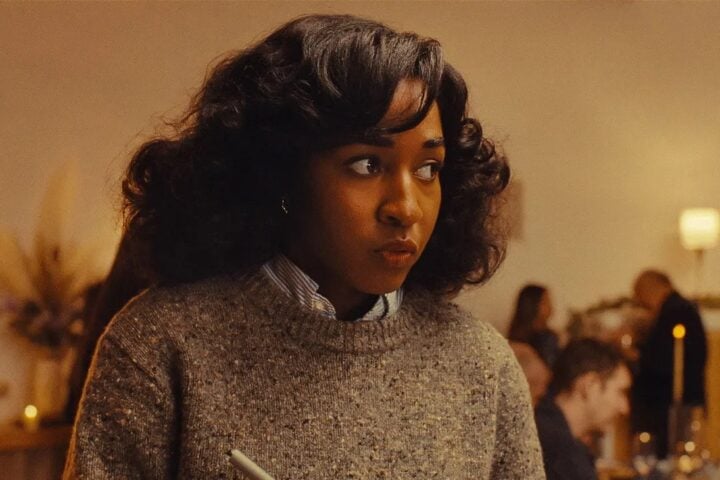It’s not much of a spoiler to say that the final image of Sean Price Williams’s solo feature directorial debut, The Sweet East, is that of Talia Ryder’s Lillian nonchalantly strolling toward and past the camera, a smirk on her face. That’s effectively the whole vibe of the film, an odyssey that traipses through the world of white supremacist academics, PizzaGate conspiracy theorists, self-satisfied filmmakers, mixed-media artists of questionable talent, and religious zealots. And as these various figure heads of a post-whatever world aspire to approximate, at once, political and social fragmentation, reactionaryism, delusion, provocation, and apathy, there Lilian is, eyes like butterfly knives being toyed with by a bored teenager.
As a cinematographer, Price Williams made a name for himself working with filmmakers like Alex Ross Perry (The Color Wheel, Listen Up Philip) and Josh and Benny Safdie (Heaven Knows What, Good Time), lending their films an earthy sense of immediacy. On 16mm, his images burn with muddy darkness that belies the seriousness of the worlds those films depict. Hope usually isn’t on the agenda of the city-dwelling films that Price Williams has shot—certainly not for the deranged rocker that Elisabeth Moss plays in Her Smell or Daniel Zolghadri’s weirdo wannabe underground cartoonist from Owen Kline’s Funny Pages.
If hope isn’t on the agenda of The Sweet East it’s because, as Nick Pinkerton’s script sees it, hope is silly and sincerity is for schmucks—something along the lines of pathetic. Where Lilian starts out as a disaffected high school student on a trip to Washington, D.C., each subsequent checkpoint is marked less by an active desire or even an attempt to imagine herself as something other than her drab self and more like the listless and unmoored wanderings of a young woman at the supposed end of the world. And at the end of the world there’s just mirthless laughter.
When Matthew (Jeremy O. Harris) and Molly (Ayo Edebiri) cajole Lilian into leading their period film about the building of the Erie Canal, she finds herself in a scene opposite “it” boy Ian (Jacob Elordi), snarling in his face, “I believe that you’re more enamored in basking in your supposed infamy, than winning a convert to your cause, which to my understanding has to do with creating a better cause.” This line, like most of the film, feels a bit like bait, a lip-smacking self-congratulation for acknowledging The Sweet East’s own brand of audience prodding. Not much earlier, Lilian spends time sleeping beneath a quilt with swastikas on it and trying to seduce its owner, an amateur entomologist and an English scholar (Simon Rex), while clad in a cream-colored teddy. Additionally, Lilian drops the r-word a handful of times. The first time, you raise an eyebrow. The fifth time, you wish the filmmakers would get on with it.
But if the film fails on its promise to be a blackly heartless comedy, it’s not for any political incorrectness; it’s because it commits the amateurish crime of conflating the idea for a joke for an actual one. Premises of varying quality litter The Sweet East—from the professor who reifies Edgar Allen Poe’s obsession with nymphette Annabel Lee, to the pierced “Antifa” who unironically self-identifies as an “artivist”—with as much payoff as you can expect from a film whose baseline seems to be a glib “whatever” when any component of it is held up for inspection. (Edebiri’s character, though, got a laugh from me when she says, “Sometimes the best actress is just a woman who says ‘yes’.”) If more effort were put into its comedy, would that then betray The Sweet East’s commitment to the noncommittal?

For all the tactility of Price Williams’s cinematography, The Sweet East is pretty fuzzy on what it wants its national tour of brainless dogma to mean. Not just in terms of a symbolic or ideological legibility, but an emotional one too. Lilian drifts from milieu to milieu, sometimes without a phone, sometimes with an ambition of what kind of person she wants to transform into, sometimes with her eye on whatever platform can surveil her at any given moment. But seldom with enough cohesion to pass the movie off as a character study of someone living in, as playwright Matthew Gasda would call it, “the dumbest of times.”
It’s difficult to believe that Lilian—if the world she inhabits also includes these various groups that are written to sound like people just real enough that one could pass them on the way to Metrograph on the Lower East Side—is completely vacant of want or desire or hatred or joy or some kind of interiority. Still, the most noxious poseurs have something in them that betrays humanity, while, as the film seems to suggest, such things are ripe for corruption or emptying.
And when Lilian is on the run, there’s no sense of propulsion, no forcefulness, to the film’s pace, even in its picaresque context. It’s not as if Lilian is a zelig, adroitly mutating to be whatever the environment she ends up in calls for. Even in the character’s passivity, neither the script nor the direction give us much of a reason for why we should be following Lilian in the first place, almost as if the filmmakers are indifferent to her indifference. Edgelords, too, are supposed to have faith in something, even if it’s their own subversiveness. That’s why “lord” is in the word.
Lilian doesn’t really qualify as a misanthrope, because she doesn’t seem to believe in anything. And neither does The Sweet East, except, maybe, that believing in something is for fools, for the pathetic, for the pretentious, for the ones who have been scammed and scarfed into it. If a level of hopelessness is understandable “in these times,” Price Williams’s film doesn’t make the case for why we the audience should be invested in Lilian’s hopelessness, much less its own. The Sweet East, then, wears its smarminess as a badge of honor, wanting its audience to accept the hell they live in, and that the film is just another reflection, or refraction, of it.
If The Sweet East is supposed to be a ribald riposte to the idea that the East Coast is some kind of paradise of forward-thinking liberals with exciting goals to remake the world in Nancy Pelosi’s image, the film doesn’t so much deconstruct and destabilize that mythology as it replaces it with its shattered-glass opposite. Badness, evil, stupidity, ignorance, and plain ol’ indifference exists all across the nation, and rather than find insight as to what’s missing in our lives and souls or what this viral disaffection serve as replacement for, never mind how we got here in the first place, Price Williams and Pinkerton merely settle for a shit-eating grin.
Briefly, though, there’s a glimmer of something more substantive than The Sweet East’s eyeroll-y smugness. Early on, Lilian escapes to a scuzzy bathroom and starts singing. She gazes at and past her visage, crooning, “I’m fun, no fear/Lost in the evening mirror.” All the melancholy for why someone might meander aimlessly from belief to belief, subculture to subculture, and so on is in Ryder’s eyes, glistening pearls beneath orangey light. In this one moment, Ryder does what the rest of the film fails to do, telegraphing a true, honest lost-ness, hopelessness, sadness. All the broken promises we have to live with glint in her gaze. There’s no smirk there.
Since 2001, we've brought you uncompromising, candid takes on the world of film, music, television, video games, theater, and more. Independently owned and operated publications like Slant have been hit hard in recent years, but we’re committed to keeping our content free and accessible—meaning no paywalls or fees.
If you like what we do, please consider subscribing to our Patreon or making a donation.







Thank you, Kyle Turner, for having the courage to write what I know many people feel. Most critics were too scared to be honest.
the film is drek
Very concise assessment of the film and the minds and hearts of the people that “lensed” it .
As a female that knows and has lived the shennanigans of the male groups involved in the making of the movie (LES movie yawns Sean,Nick)…. I was repulsed but not surprised to see the manifestation of a HOLLOW FEMALE that relies on male attention to survive.
this movie’s subject, is not random at all… yuck